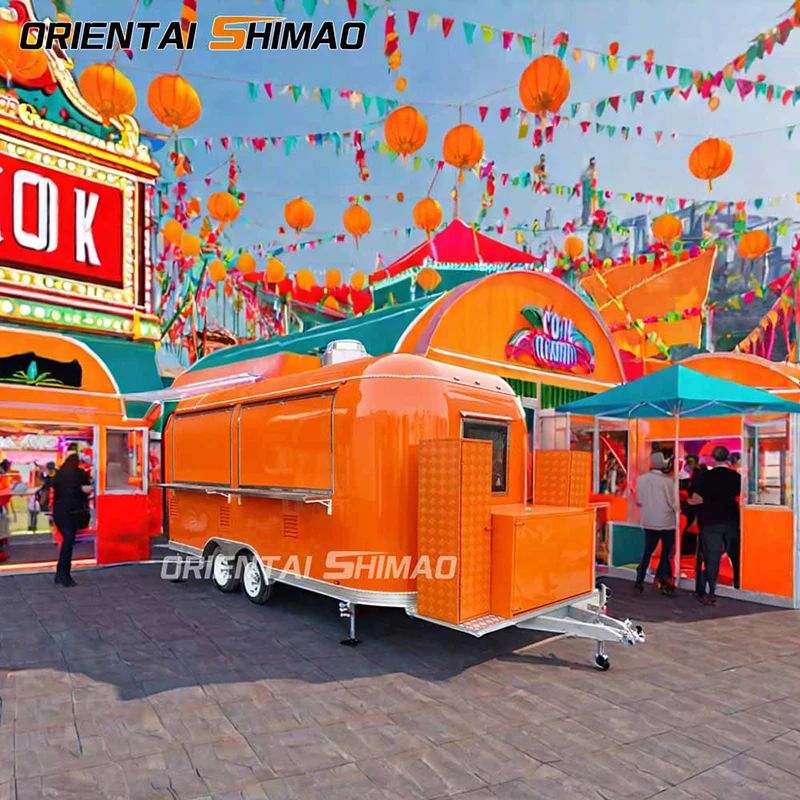Benefits of Food Trailers
2024-07-15
A food trailer, also known as a mobile food trailer or food truck, is a vehicle equipped with a kitchen and serving area designed for preparing, cooking, and selling food. It provides a flexible and mobile platform for food entrepreneurs to reach customers at various locations, events, and markets. Here’s a comprehensive overview covering different aspects of food trailers:
Features and Components:
1. Kitchen Equipment:
- Cooking Appliances: Typically includes stoves, griddles, fryers, ovens, and sometimes specialized equipment like rotisseries or smokers, depending on the menu.
- Refrigeration: Refrigerators and freezers for storing perishable ingredients and beverages.
- Storage: Cabinets, shelves, and drawers for utensils, cookware, supplies, and dry ingredients.
2. Utilities:
- Water Systems: Equipped with sinks for handwashing, dishwashing, and food preparation, often including hot water heaters and wastewater tanks.
- Power Supply: Runs on electricity from generators or shore power connections, sometimes supplemented by propane for cooking equipment.
3. Layout and Design:
- Interior Layout: Designed for efficient workflow, with consideration for food preparation, cooking, and serving areas.
- Exterior Design: Customizable with branding, signage, menu boards, and serving windows to attract customers and convey the food concept.
4. Mobility and Transport:
- Vehicle Type: Can range from compact trailers towed by vehicles to larger trucks that are self-propelled.
- Towing Capacity: Determines the size and weight of the trailer that can be safely towed by a vehicle.
Benefits of Food Trailers:
- Flexibility: Ability to move to different locations and events, capitalizing on varied customer demographics and seasonal opportunities.
- Lower Overhead: Typically lower startup and operating costs compared to brick-and-mortar restaurants, with reduced real estate expenses and utilities.
- Direct Customer Interaction: Provides a platform for direct customer engagement, feedback, and building a loyal customer base.
Considerations:
- Regulations and Permits: Compliance with local health department regulations, permits for food handling and sales, and zoning requirements for operating in public or private spaces.
- Maintenance: Regular upkeep of equipment, cleanliness, and sanitation to ensure food safety and operational efficiency.
- Weather and Seasonality: Consideration of weather conditions impacting operations and choosing locations accordingly.
Popular Food Trailer Concepts:
- Street Food Classics: Offering popular street foods such as tacos, burgers, hot dogs, and sandwiches.
- Ethnic Cuisine: Serving authentic dishes from various cultures, catering to diverse tastes and preferences.
- Gourmet and Fusion: Specializing in gourmet meals, fusion cuisine, or unique culinary creations to attract food enthusiasts.
- Specialty Desserts and Beverages: Featuring desserts, ice creams, coffees, and beverages for festivals, fairs, and dessert-centric events.
Growth and Trends:
- Technology Integration: Utilizing mobile apps for ordering, payment processing, and social media marketing to enhance customer reach and engagement.
- Sustainability Initiatives: Incorporating eco-friendly practices such as using biodegradable packaging and reducing food waste to appeal to environmentally conscious consumers.
- Collaborative Events: Partnering with local businesses, breweries, or event organizers to expand market reach and visibility.
Food trailers offer a dynamic and entrepreneurial opportunity in the food service industry, combining mobility with the ability to deliver freshly prepared meals and unique culinary experiences to a wide audience. Whether you're considering starting a food trailer business or exploring different concepts, understanding these aspects can help in planning and launching a successful venture.



